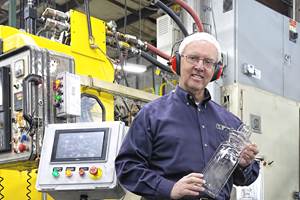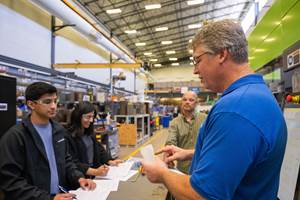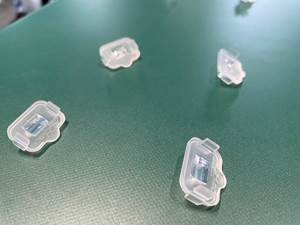There are a lot of numbers you can look at to tell the story of MDI, a Minneapolis-based company that extrudes corrugated sheet and converts it into tubs, totes, boxes and trays for the likes of the U.S. Postal Service and Fortune 500 firms in manufacturing, warehousing, distribution, logistics, e-commerce, and others.
Start with the number 1964. That is the year the company started as Minnesota Diversified Industries. Sister Anna Marie Meyers had 14 high school students with disabilities about to graduate without job opportunities. She founded The Occupational Training Center (OTC) as an extension program of Christ Child School in St. Paul. Not long after, the OTC became independent of the school and named John DuRand as its executive director, thus beginning the first Minnesota-supported work program for people with disabilities. OTC evolved into MDI, which remains a not-for-profit business.
Remarks Barbara Majerus, MDI’s v.p. of sales. “We believe people with disabilities have abilities, and they deserve opportunities to have meaningful work and become meaningful contributors to society.” Majerus describes DuRand, who died in 2008, as the “catalyst behind the social and affirmative business enterprise model” who wrote books and gave speeches on the topic.
There are other numbers too. The firm has four facilities in Minnesota: a 60,000 ft2 plant at its Minneapolis headquarters; 83,000 ft2 in Grand Rapids that houses MDI’s two coextrusion lines, along with die-cutting and printing operations; a 36,000 ft2 plant in Hibbing that makes wire frames used in many of its totes and boxes; and 110,000 ft2 in Cohasset for design engineering, prototyping and other tasks.
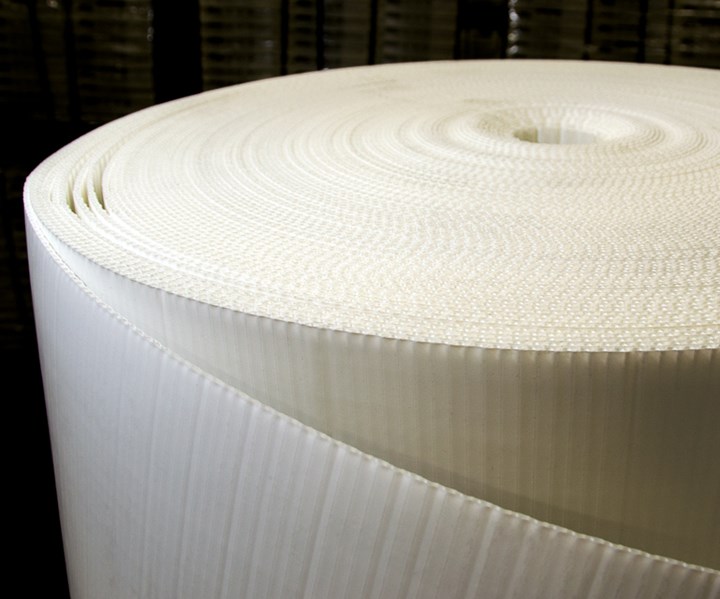
MDI can also furnish sheet in rollstock.
Last year, MDI consumed 7.5 million lb of material, mostly HDPE, and had sales of about $30 million. It produced 2,681,755 plastic units in 2019. Both these numbers can vary significantly based on the Post Office’s order volume. “Our sales vary based on USPS,” says Rod Wood, MDI’s COO. “In some years it’s been as high as $49 million.” The Post Office accounts for roughly half of MDI’s sales.
But perhaps the most telling number on MDI’s ledger is 46. That represents the percentage of its 388 employees (as of the end of 2019) with disabilities. “Our goal is to have 50% of our workforce with disabilities. Our contract with the USPS requires that 75% of the labor hours for the postal tote be performed by people with disabilities.” All employees are paid at rates above the minimum wage, with benefits. Diane Meyer, the company’s employee support supervisor, was quoted in MDI’s 2019 Annual Report: “Our employees inspire and impress us every single day. They represent an untapped workforce in Minnesota and across the country. Jobs at MDI include support from on-site Employment Support Specialists. These jobs empower individuals to achieve greater self-sufficiency and personal fulfillment in an inclusive environment.”
In that same report, Jeanne Eglinton, MDI’s director of employment, notes, “Our mission is more than providing jobs, it’s about creating an environment where employees can grow. Since 2017, more than 100 MDI participants have graduated from Career Skills, which teaches professional skills needed in today’s workforce—including communication, leadership, work ethic, teamwork, and critical thinking. At the end of the program, graduates deliver their ‘elevator speech’ (a brief resumé) and share their goals for the future.
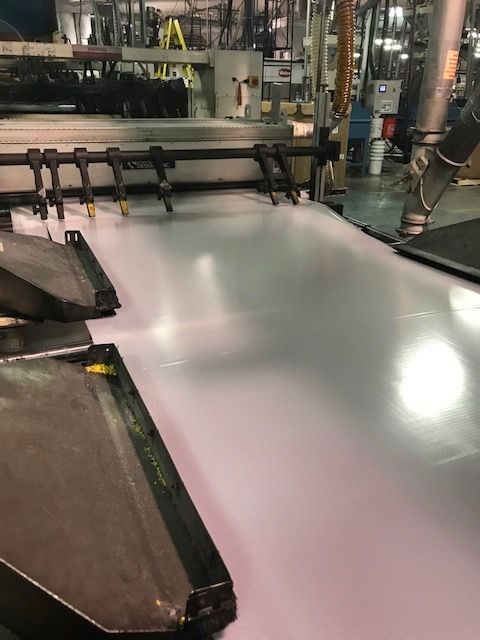
MDI runs two coextrusion lines for corrugated HDPE sheet in Grand Rapids, and is looking to add a third line for PP.
“Our goal is to help people with disabilities find meaningful employment and help employers see their strengths and talent. Career Skills is a true testament to the tenacity and dedication that exists in this untapped workforce,” she adds.
MDI also offers employees technical training at community colleges and brings in outside experts to train on safety, Kaizen, and lean manufacturing
“We act like a for-profit company when it comes to manufacturing.”
MDI is among 10 Twin Cities organizations that in 2019 formed the Unified Work Coalition (UWC) with the intent of advancing employment opportunities for people with disabilities. The group’s long-term goals include creating a sustainable employment model, based on real-life working examples, that assists businesses who hire and support people with disabilities.
“We act like a for-profit company when it comes to manufacturing,” says Majerus. “We expect everyone to meet or beat standards, work to their ability, be highly competitive, be highly productive and be highly efficient. And I would say that the vast majority of our workforce, while having a disability of some type, are highly functional.”
It Starts with Sheet
MDI began by purchasing sheet from other processors, but in 1999 began processing its own sheet in Grand Rapids. Says Majerus, “The Post Office was the founding customer of MDI’s plastics business.” That 1999 extrusion line, purchased from HPM, is still running today, Wood says.
In 2005, MDI expanded its Grand Rapids facility and added a second extrusion system, this one from Welex, which Wood calls the “primary line,” that runs on a 24∕5 schedule. “We bring the HPM line on as needed, as this capacity was built primarily for the needs of the Post Office.” Both lines have a 6-in. primary extruder and two 4-in. coextruders. MDI refeeds edge trim and die-cut scrap back into its process.
“We went with a corrugated sheet made mainly out of HDPE from the start because that it what the Post Office specified,” Wood says. Sheet is typically made 4-mil thick at widths to 53.5 in. MDI follows specs for its sheet that originate in the cardboard industry; its typical sheet ranges from 0.16 lb/ft2 to 0.3 lb/ft2.
“We are one of the few companies in our markets that actually have a core business built around extruding polyethylene sheet,” says Majerus. “Traditionally polyethylene has been more economical from a commodity-index perspective. Every now and then PP falls below that, but historically PE has been a more economical solution than PP. And there are certain applications in which the very nature of PE make it advantageous. For example, in very cold environments it does not become brittle. In our process, where we add a little bit of LLDPE to the HDPE, the totes work very well on conveyors because they have a little bit of a ‘sticking power’ to them.”
PP boards, on the other hand, do not handle cold environments very well—they become very brittle and crack. But because there are applications where PP may be a better fit, MDI also furnishes PP-based crates and totes, buying sheet from outside vendors and die-cutting, folding, and ultrasonic welding it in-house. The company is looking at adding its own PP sheet extrusion line, so it will be vertically integrated in PP as it is in HDPE.

MDI is vertically integrated in corrugated HDPE tote manufacturing. Extruded sheet is die cut, printed, folded and ultrasonic welded in house.
Minnesota Diversified Diversifies
Some 11 years ago and true to its name, MDI launched a diversification strategy to enter the commercial business to help offset the volatility of its business with the Post Office. Recalls Majerus, who joined the company around that time, “We set up a robust reseller network around the U.S., and now are selling to many companies in manufacturing, warehousing, distribution centers, transportation/logistics, agricultural, sometimes medical related—any environment where goods are made, organized, or transported.” Lots of those markets were still using cardboard, and MDI has grown that business to several million dollars a year, says Majerus. Last year alone, it got a $2.4 million order from Fortune 500 company in the warehousing/distribution industry that had been using cardboard.
Majerus notes that 95% of its commercial business is channeled through its reseller network. Having resellers across the country puts MDI in close geographic proximity to every major city in the U.S., but the company works hard to maintain direct contact with its end-use customers as well. “We are often in collaborative and joint meetings with our resellers and the final customers. The business ultimately goes through the reseller, but is supported throughout the sales process by MDI’s sales-channel managers. We trust our resellers to do a great job representing our products—even though it’s not always exclusive, and there are cases where the reseller has its own brand. Plus, we don’t have the ability to create the infrastructure to get the kind of geographic and proximity coverage into all those accounts that we now have if we were to sell direct. We found a reseller model that has worked really well.”
She adds, “Our level of service is a cut above everybody else, in terms of flexibility, responsiveness, lead times, and customer service. We wrap our arms around our customers. We treat them with ‘TLC.’ As a result, we have an extremely high retention and loyalty rate among both customers and resellers.”
MDI does not have a one-size-fits-all approach to the commercial business, relying on its team of packaging design engineers to ensure the product line is customized for each application and its specific requirements. It has CNC machines to quickly turn prototypes around. And it has what Majerus calls “wide flexibility” in terms of order volume. She elaborates, “A lot of other extruders are not interested in working with you unless you have truckload quantities. But we have a niche of varying products, volumes, and custom solutions.”
“We wrap our arms around our customers. Treat them with TLC.”
MDI took customization to the extreme in one recent commercial application. A new customer that MDI’s reseller identified had been using cardboard in its warehousing operation and was experiencing outages as a result of the box breaking down on conveyors that ran as fast as 700 ft/min. MDI provided a PE tote, only to have the customer note that it made too much noise on the conveyor and was too light when only small or light parts were being transported.
Some 18 design iterations later, MDI had a final solution that involved redesigning the tote, adding hardboard to its bottom, and angling the flutes. This not only provided the sound-deadening the customer required, but the extra weight prevented the container from flying off the conveyor in instances where it was carrying light items. “We worked through varying solutions until we came up with the right product,” says Majerus. “This has turned into a multi-million-dollar opportunity for MDI and has provided significant job opportunities for people both with and without disabilities.”
Related Content
Plastics Processors Who Hire ‘Second-Chance’ Workers Do Well by Doing Good
Two blow molders with long-standing programs of hiring formerly incarcerated low-level offenders have helped these individuals re-enter their communities and have benefited from an additional resource during chronic labor shortages.
Read MoreEducating the Next Generation of Plastics Professionals
These schools and local industry are working together to close the workforce gap in the plastics industry by offering hefty plastics curricula and training programs for degree-seeking students as well as current plastics employees looking to upskill.
Read MoreThe Cost of High Employee Turnover in Injection Molding: Why Retention Matters
Starting in molding in 1993 and clocking in for nearly every job on the floor over the intervening decades, I’ve seen all sides of the hiring, training and retention process in the industry. Here are my thoughts on how to keep your most important asset — your people.
Read MoreSilicone Elastomer Course Returns
After completely filling the classroom last year, the Silicone Elastomers Technology and Fabrication course returns to Pomona, Calif. Jan. 31-Feb. 3.
Read MoreRead Next
Beyond Prototypes: 8 Ways the Plastics Industry Is Using 3D Printing
Plastics processors are finding applications for 3D printing around the plant and across the supply chain. Here are 8 examples to look for at NPE2024.
Read MorePeople 4.0 – How to Get Buy-In from Your Staff for Industry 4.0 Systems
Implementing a production monitoring system as the foundation of a ‘smart factory’ is about integrating people with new technology as much as it is about integrating machines and computers. Here are tips from a company that has gone through the process.
Read MoreLead the Conversation, Change the Conversation
Coverage of single-use plastics can be both misleading and demoralizing. Here are 10 tips for changing the perception of the plastics industry at your company and in your community.
Read More
























